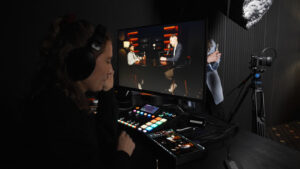Article overview: "What is the best way to prepare for a podcast?"
| Main topics | Sub-topics |
|---|---|
| 1. introduction | Why preparation is crucial for podcasts |
| 2. definition of the podcast goals | Target group, topic selection and target definition for the episode |
| 3. researching the content | Relevant facts and sources for authentic episodes |
| 4. creation of a script | Structured script and key points for smooth transitions |
| 5. structure of the episode | Introduction, main section and call-to-action as a successful structure |
| 6. technical preparation | Microphone, recording software and all necessary settings |
| 7. test run and sound check | Technical tests for a smooth process on the day of recording |
| 8. voice training and articulation | Tips for clear speech and an appealing sound |
| 9. prepare the interlocutor | Preparing questions, briefing and making arrangements with guests |
| 10. create an environment and atmosphere | Choice of recording location and minimization of background noise |
| 11. overcoming nervousness | Practical tips for relaxation and increasing self-confidence |
| 12. optimize target group approach | Tailor tonality and choice of topic to the listener |
| 13. planning and time management | Schedule and buffer for stress-free recording |
| 14. observe legal aspects | License rights, music, quotes and permissions |
| 15. marketing and publication planning | Strategies for publication and promotion |
| 16. tips for the follow-up | Correction, editing and obtaining feedback |
| 17 Frequently asked questions (FAQ) | Answers to the most frequently asked questions about podcast preparation |
| 18. conclusion | Summary and motivation for successful inclusion |
What is the best way to prepare for a podcast?
1. introduction: Why preparation is crucial for podcasts
Podcasts are becoming increasingly popular and offer an excellent platform for sharing knowledge, stories and entertainment. However, behind every successful episode is sound preparation. With the right planning and structure, you can not only make your podcast look professional, but also make a lasting impression on your target audience. This guide provides you with step-by-step instructions on how to best prepare for a podcast episode.
2. definition of the podcast goals
Target group, topic selection and target definition for the episode
Think in advance about who you want to reach with your podcast and what topic interests your target group. Clearly define the aim of the episode: do you want to inform, inspire or entertain? These basic ideas form the basis for a well-structured episode that will leave a lasting impression on listeners.
3. researching the content
Relevant facts and sources for authentic episodes
Regardless of whether you obtain expert opinions, use statistics or share personal experiences: Thorough research is essential in order to deliver well-founded and credible content. Make a note of the most important information and prepare it so that you can incorporate it into the podcast in an understandable and authentic way.
4. creation of a script
Structured script and key points for smooth transitions
A good script is like a roadmap that guides you safely through the episode. It doesn't have to be word for word, but a list of the main points ensures that you don't forget anything essential. This way you can stay focused on your content and make the episode logical and fluid.
5. structure of the episode
Introduction, main section and call-to-action as a successful structure
Each episode should have a clear structure that guides your listeners through the topic. Start with a short introduction that whets the appetite for more. The main part contains the core information, and at the end there should be a call-to-action to actively involve your listeners and keep them coming back.
6. technical preparation
Microphone, recording software and all necessary settings
The technical quality of a podcast is crucial. Choose a good microphone and software that meets your requirements. Pay attention to the recording and sound quality to ensure a pleasant listening experience. A headset, pop protection and a stable recording environment help to increase the quality.
7. test run and sound check
Technical tests for a smooth process on the day of recording
Carry out a sound check before starting the recording. Test the microphone and all software settings to ensure that your voice is recorded clearly and without noise. Also check that there is enough memory available and that the technology is stable.
8. voice training and articulation
Tips for clear speech and an appealing sound
A podcast depends on your voice. Practice speaking slowly and clearly before recording. Warm-up exercises help to warm up your voice and improve articulation. Friendly and natural language helps to create a pleasant atmosphere.
9. prepare the interlocutor
Preparing questions, briefing and making arrangements with guests
If you invite guests, inform them about the topic well in advance and prepare relevant questions. A brief preliminary discussion gives the guest the opportunity to prepare themselves as well and creates a relaxed atmosphere in which authentic conversations can take place.
10. create an environment and atmosphere
Choice of recording location and minimization of background noise
A quiet environment is the be-all and end-all of a good recording. Avoid disturbing noises, close windows and inform roommates or colleagues. A suitable room and the right atmosphere increase concentration and create pleasant acoustics.
11. overcoming nervousness
Practical tips for relaxation and increasing self-confidence
Nervousness can affect the quality of your recording. Prepare yourself mentally, take time to relax and go through everything again. Breathing exercises and positive visualizations help to calm your nerves and make you more confident.
12. optimize target group approach
Tailor tonality and choice of topic to the listener
Adapt your language and tone to the expectations of your target group. Do you want to communicate formally or casually? A direct reference to the target group creates closeness and ensures that your listeners feel addressed.
13. planning and time management
Schedule and buffer for stress-free recording
A good schedule provides structure. Plan the sequence of your episode and take breaks if necessary. A clear time frame makes it easier to concentrate and helps you to focus on the essentials.
14. observe legal aspects
License rights, music, quotes and permissions
Pay attention to licensing rights when using music or quotes and obtain permission if necessary. Clarify in advance which legal requirements must be observed in order to avoid legal problems later on.
15. marketing and publication planning
Strategies for publication and promotion
Prepare the publication process and define a marketing plan. Use social media, your website or email newsletters to promote the episode. A planned release date and promotion strategy will ensure a wider reach.
16. tips for the follow-up
Correction, editing and obtaining feedback
After recording, you should edit the episode, remove distracting noises and optimize the sound quality. Ask friends or colleagues for feedback to further improve the episode. This follow-up work will ensure that you publish a high-quality episode.
17 Frequently asked questions (FAQ)
How important is a script for a podcast?
A script helps to keep the thread running and to structure the episode. This results in a clear and well thought-out presentation.
How do I find the right topic for my episode?
Think about which topics are relevant for your target group and what content interests them. Research current trends and adapt them accordingly.
What technology do I need for a podcast recording?
A good microphone, recording software and headphones are the basis for a successful recording. Pop protection and a quiet environment increase the quality.
How can I prepare for an interview?
Prepare relevant questions and inform the guest about the process and the topic. A relaxed preliminary talk helps to create a natural conversation atmosphere.
What can I do about nervousness?
Relaxation techniques, breathing exercises and good preparation help to reduce nervousness and appear confident.
How important is sound quality?
Sound quality is crucial to providing listeners with a pleasant listening experience. Invest in good technology and record in a quiet room.
18. conclusion
A successful podcast recording requires careful preparation. From the research to the technical equipment and the right way of speaking - every detail counts. With the right preparation and a clear structure, you can produce an authentic and listenable episode that will inspire your listeners.











